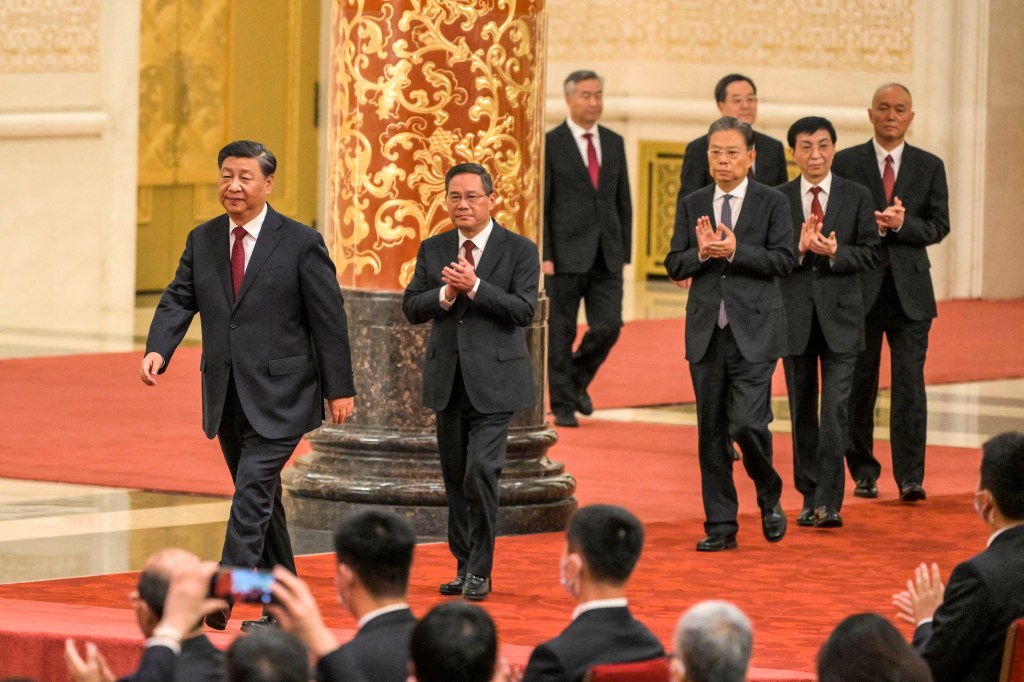The degree of Chinese leader Xi Jinping’s consolidation of power became clear on Sunday, as the country’s ruling Communist Party unveiled its new leadership following a twice-a-decade congress.
As widely expected, Xi clinched a norm-breaking third term as head of the party. But many were surprised by just how far he had managed to shunt aside officials deemed relatively liberal or pragmatic, and elevate his own allies to senior roles.
Videos by VICE
“Observers before the congress assumed there would be representatives of other factions and some kind of balance between various camps within the leadership,” Jean-Pierre Cabestan, a professor emeritus at Hong Kong Baptist University, told VICE World News. “These assumptions were wrong. Xi Jinping is the winner who takes all.”

Besides Xi, all six other members of the Politburo Standing Committee, the country’s top governing body, are people close to the Chinese president, Cabestan said.
It is a major victory for Xi, whose ideology and vision would dominate China’s policy direction in the next five years—or more, given how he upended the unwritten two-term limit for the country’s leaders. But analysts say the absence of any counterbalance does not bode well for China or the rest of the world. By surrounding himself with yes-men, Xi further reduces the room for debate.
“Policies would be much more coherent as there is less in-fighting among the leaders. Everybody’s ready to carry out Xi’s priorities,” Cabestan said. “But the downside of this lineup is there isn’t much room for checks and balances, and giving the number one of the party advice and information he doesn’t like. This leadership is prone to making more mistakes in the future, both internationally and domestically.”
Some would argue that one of those mistakes is the country’s zero-COVID policy. While China’s strict approach to managing the pandemic has kept the number of fatalities low, the recurring lockdowns and stringent quarantine measures have battered the Chinese economy and left the country isolated from the rest of the world for more than two years.
But in another sign that the policy is here to stay, Li Qiang, who oversaw a painful two-month lockdown in Shanghai, was promoted to the No. 2 position of the standing committee, to the surprise of many. Li is now on track to become the country’s next premier in March.
Li’s appointment and the sidelining of pro-market officials—such as Hu Chunhua, once considered a leading candidate for the country’s premier—also laid bare Xi’s shifting priorities going forward. “Policy debate in the economic realm no longer exists, and security concerns will be put ahead of economic efficiency,” said Chen Gang, assistant director at the National University of Singapore’s East Asian Institute.
The prospect of another five years under Xi’s dream team sent Chinese stocks crashing on Monday, wiping tens of billions of dollars in market value of the country’s biggest U.S.-listed private companies. Some analysts expect state-owned enterprises to get a boost from the Chinese government, which under Xi has steered away from market principles toward state control. The global economy would take a hit if China’s growth, which helped lead the world out of the 2008 financial crisis, loses steam.
Similarly, Xi is expected to double down on his assertive foreign policy, including its rivalry with Washington, which could become even more confrontational. Its brutal crackdown on dissent, particularly in Hong Kong and Xinjiang, intimidation of Taiwan, and its strategic partnership with Russia, are among issues that have strained its relations with the West and could have economic and political consequences.
Xi addressed these concerns in a 105-minute speech at the opening of the party congress, when he said the party faced “grave, intricate international developments” and “external attempts to blackmail, contain, blockade and exert maximum pressure on China.”
China’s answer to the geopolitical crisis so far is to not back down, and to reject foreign criticisms as attempts to interfere with its domestic affairs. Under a more empowered Xi, this combative stance will likely continue.
“China’s posture toward the U.S. will likely remain defiant and unyielding,” said Amanda Hsiao, senior China analyst at the Brussels-based International Crisis Group. “Beijing is likely to continue to insist that improvements to the relationship are conditioned on Washington softening its attitude and changing its behavior, not the other way around.”
And this is only for the next five years. With no obvious successor in sight, Xi—and his policies—could stay around for much longer.






